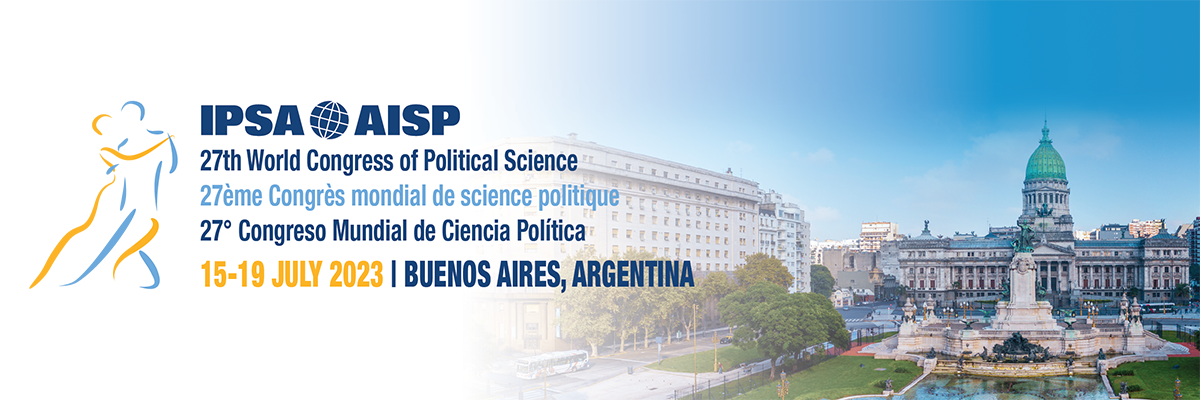

Recap of the 2023 IPSA World Congress - Day 3 (18 July)
Publication date: Sun, 09 Jul 2023
Pablo Oñate Becomes President of IPSA
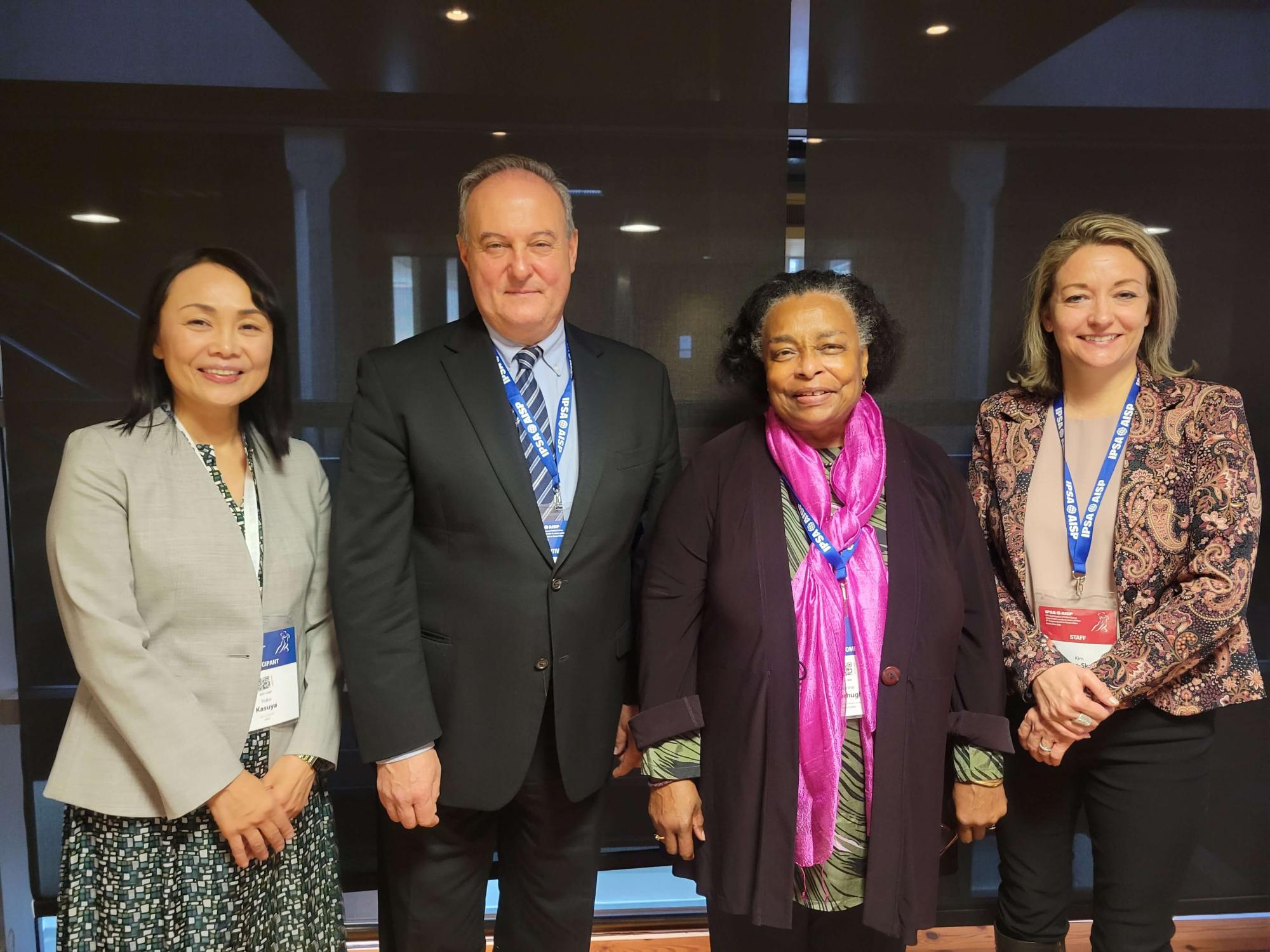 Pablo Oñate (Spain), who was elected President-Elect by the IPSA Council in 2021, officially became the new President of IPSA on 18 July, following the election of the President-Elect Yuko Kasuya (Japan) by the Council at the 2023 IPSA World Congress in Buenos Aires. Succeeding Dianne Pinderhughes (United States), Prof. Oñate will serve a two-year term from 2023 to 2025.
Pablo Oñate (Spain), who was elected President-Elect by the IPSA Council in 2021, officially became the new President of IPSA on 18 July, following the election of the President-Elect Yuko Kasuya (Japan) by the Council at the 2023 IPSA World Congress in Buenos Aires. Succeeding Dianne Pinderhughes (United States), Prof. Oñate will serve a two-year term from 2023 to 2025.
Prof. Oñate is the Chair of Political Science at the University of Valencia. His primary field of research is comparative politics (representation and parliamentary elites) and, secondarily, elections and electoral behaviour. He is the author and editor of several books and journal articles on these topics. He served as Secretary-General of the Spanish Political Science Association (2005-2013) and as Chair of the Local Organizing Committee (LOC) of the IPSA 22nd World Congress in Madrid.
Elected President of the European Confederation of Political Science Associations (2014 and 2016), he has also worked for several organizations in the international field (in several Central and Latin-American countries, as well as Bosnia-Herzegovina and Myanmar) dealing with democratization, institutional reform and electoral systems.
On behalf of IPSA and the global political science community, we congratulate Prof. Oñate on becoming the 27th IPSA President.
Photo (left to right): IPSA President-Elect Yuko Kasuya, IPSA President Pablo Oñate, IPSA Past President Dianne Pinderhughes and IPSA Executive Director Kim Fontaine-Skronski.
The Council Elects Yuko Kasuya as IPSA’s President-Elect
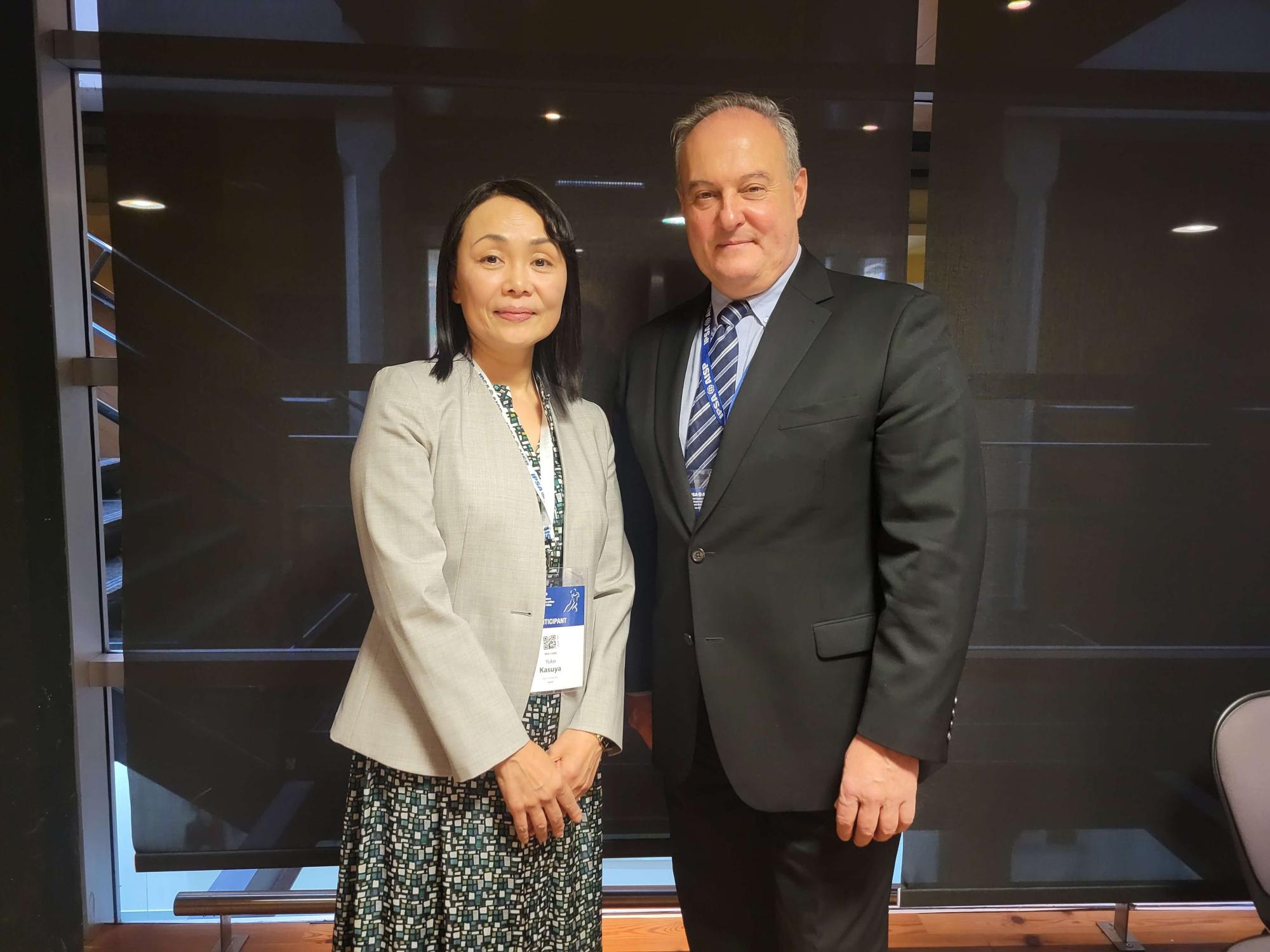 The IPSA Council, the Association’s highest decision-making body, has elected Yuko Kasuya (Japan) as the new President-Elect. Prof. Kasuya will serve a two-year term as President-Elect and will become President at the 2025 IPSA World Congress in Seoul, South Korea.
The IPSA Council, the Association’s highest decision-making body, has elected Yuko Kasuya (Japan) as the new President-Elect. Prof. Kasuya will serve a two-year term as President-Elect and will become President at the 2025 IPSA World Congress in Seoul, South Korea.
Prof. Kasuya is Professor at the Department of Political Science at the Faculty of Law of Keio University, Tokyo, Japan. Her primary research field is comparative politics, with a particular focus on regime transition, political institutions, Southeast Asia, especially the Philippines, as well as East Asia, particularly Japan. She is currently engaged in research examining democratic backsliding, polarization, and disinformation. She has published two single-authored books, seven edited volumes, and numerous articles both in English and Japanese. She holds a Ph.D. in International Affairs from the University of California, San Diego, an M.A. in Development Studies from the Institute of Social Studies in the Netherlands, and a B.A. in Law from Keio University.
She was a member of the IPSA Executive Committee from 2016 to 2018. She also served as IPSA Vice-President from 2018 to 2021. Prof. Kasuya currently serves as President of the Japan Association of Comparative Politics and as Director of the V-Dem East Asia Regional Center.
We warmly welcome Prof. Kasuya back to the IPSA Executive Committee and congratulate her on her new position.
Photo (left to right): IPSA President-Elect Yuko Kasuya and IPSA President Pablo Oñate.
IPSA and ECPR Formalize their Cooperation
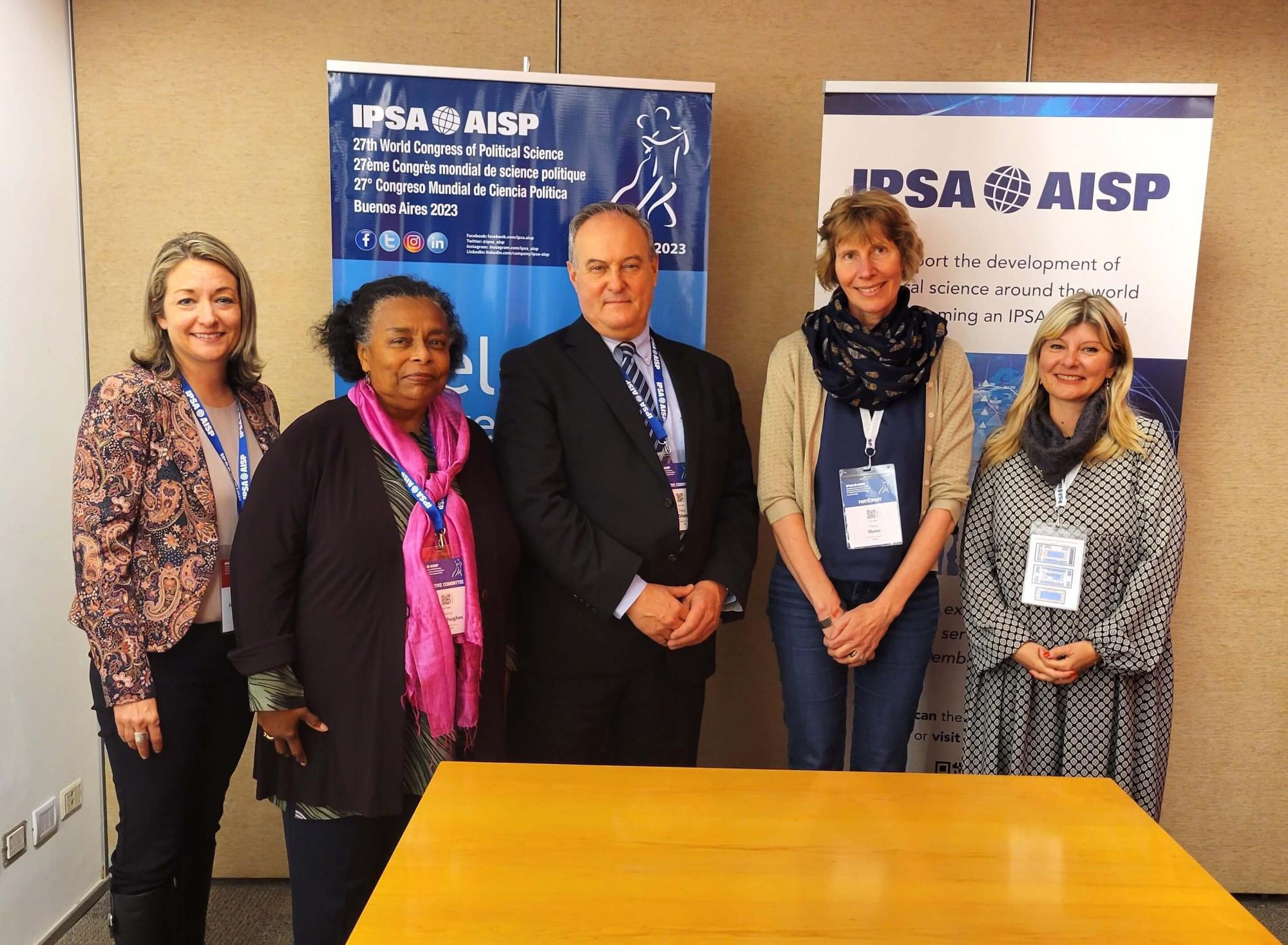
We are pleased to announce that IPSA and the European Consortium for Political Research (ECPR) have signed an agreement to strengthen their academic cooperation. A memorandum of understanding (MoU) was signed by IPSA President Pablo Oñate and ECPR Vice-Chair Petra Meier on 18 July at the 2023 IPSA World Congress in Buenos Aires, following a meeting with the IPSA and ECPR leadership. The meeting was attended by IPSA Past President Dianne Pinderhughes, IPSA Executive Director Kim Fontaine-Skronski, and ECPR Executive Committee member Daniela Irrera.
The MoU will establish an official bilateral agreement between the two associations, allowing them to further their long-standing collaboration on a number of fronts. The bilateral agreement will allow IPSA and ECPR to organize academic panels at each other’s main events (the IPSA World Congress of Political Science and the ECPR General Conference).
Photo (left to right): IPSA Executive Director Kim Fontaine-Skronski, IPSA Past President Dianne Pinderhughes, IPSA President Pablo Oñate, ECPR Vice-Chair Petra Meier and ECPR Executive Committee member Daniela Irrera.
IPSA and AECPA to Launch a New Summer School on Political Communication Methods in 2024
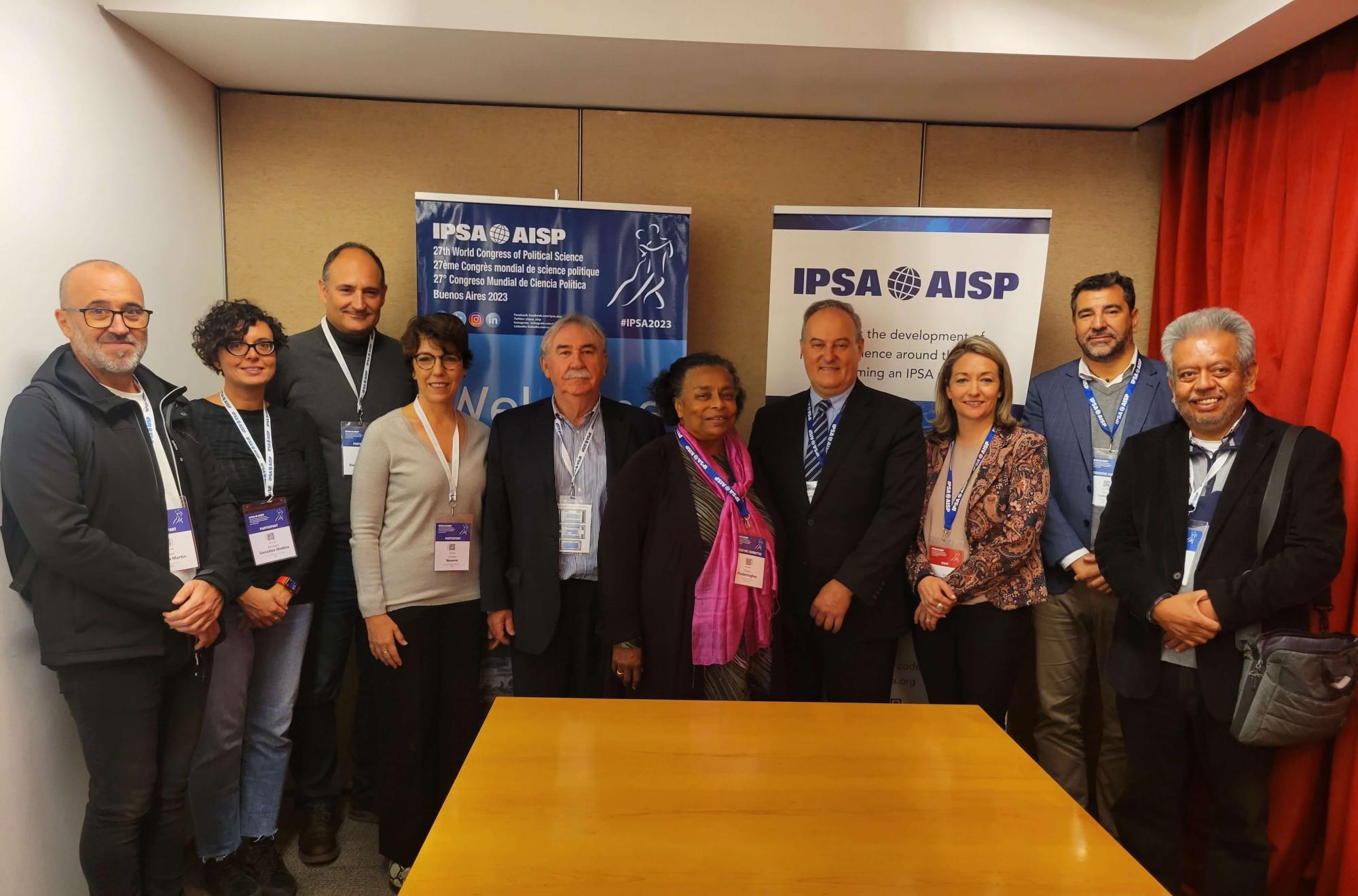
IPSA is expanding its Summer School program with a new offering on Political Communication Methods. The IPSA-AECPA Summer School on Political Communication Methods will be launched in 2024 in collaboration with the Spanish Association of Political and Administrative Science (AECPA).
The new summer school was announced after a meeting and the signing of a Memorandum of Understanding (MoU) between IPSA President Pablo Oñate and AECPA President Juan Montabes at the 2023 IPSA World Congress in Buenos Aires on 18 July. The meeting was also attended by IPSA Past President Dianne Pinderhughes, IPSA Executive Director Kim Fontaine-Skronski, IPSA Summer Schools Coordinator (2021-2023) Óscar Luengo and other AECPA representatives. The MoU formalizes the partnership between IPSA and AECPA and sets the framework for the Summer School’s development.
The IPSA-AECPA Summer School on Political Communication Methods will join two other new summer schools that IPSA has established in 2023 with prestigious European academic institutions: the IPSA-Poznań Summer School for Methods in Political Science, New Media and Communication Research (Adam Mickiewicz University in Poznań, Poland) and the Mostar Summer School on Methods (University of Mostar, Bosnia and Herzegovina).
Photo (left to right): AECPA team, AECPA President Juan Montabes, IPSA Past President Dianne Pinderhughes, IPSA President Pablo Oñate, IPSA Executive Director Kim Fontaine-Skronski, IPSA Summer Schools Coordinator Óscar Luengo (2021-2023), Jesús Tovar Mendoza (WC2023 LOC Special Guest Member).
IPSA-ISA Leadership Meeting
IPSA and the International Studies Association (ISA) leadership met at the 2023 IPSA World Congress in Buenos Aires on 18 July. The meeting was attended by IPSA President Pablo Oñate, IPSA Past President Dianne Pinderhughes, IPSA Executive Director Kim Fontaine-Skronski and ISA President-Elect Marijke Breuning.
The purpose of the meeting was to promote cooperation and dialogue between the two leading academic organizations in political science and international studies. Participants discussed several topics of mutual interest, such as the challenges and opportunities of interdisciplinary research and the promotion of diversity and inclusion in the academic community. Having signed a Memorandum of Understanding in 2021 to enhance their academic cooperation, both associations are dedicated to further strengthening their collaboration on several fronts.
Photo (left to right): IPSA Executive Director Kim Fontaine-Skronski, IPSA Past President Dianne Pinderhughes, ISA President Marijke Breuning and IPSA President Pablo Oñate.
Plenary Session: Challenges and Opportunities for a Post-Pandemic Political Science
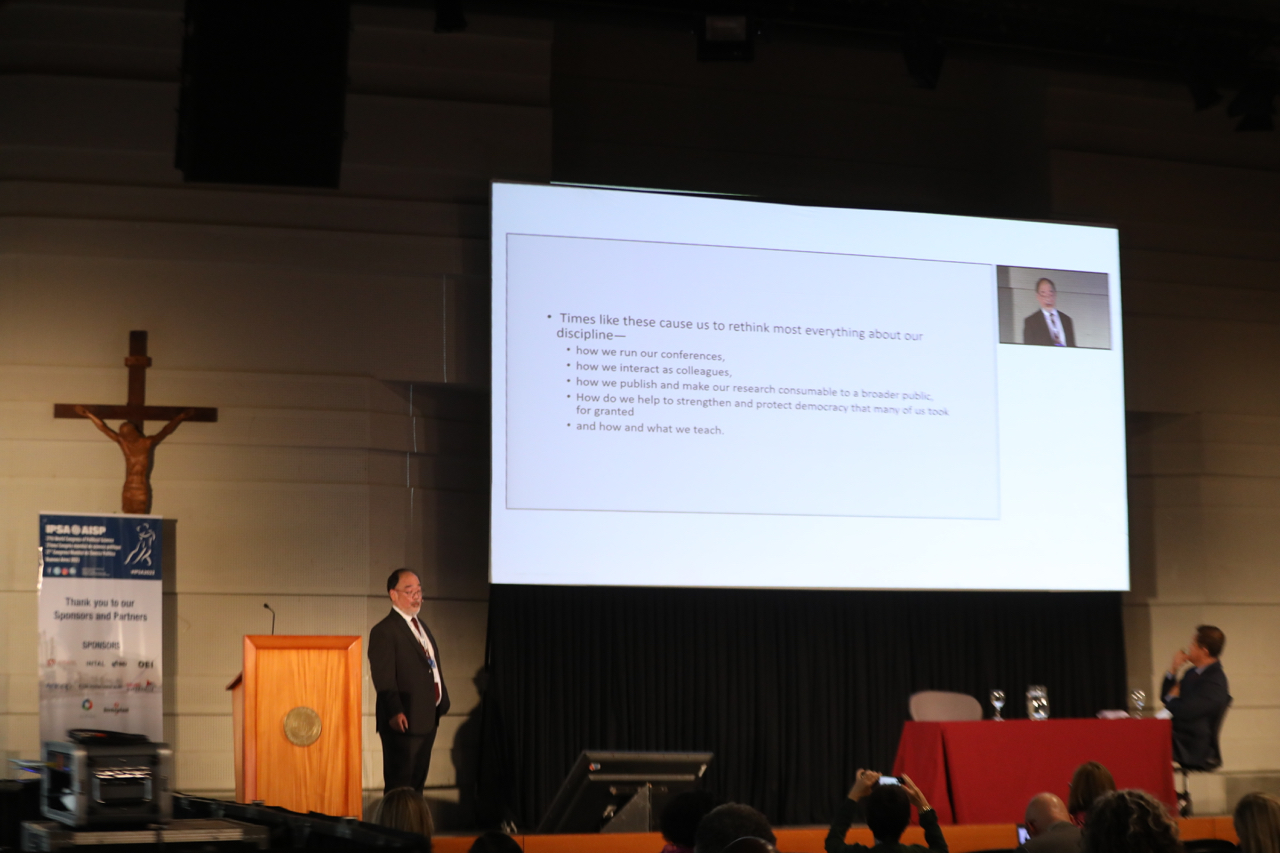 The third plenary session was introduced by Program Co-chair Euiyoung Kim. He described the boundaries between teaching and research as significant issues in the field of political science. He then invited the keynote speaker, Dr. John Ishiyama, University Distinguished Research Professor at the University of North Texas, former President of the American Political Science Association (APSA), and a leading figure in this topic, to take the stage.
The third plenary session was introduced by Program Co-chair Euiyoung Kim. He described the boundaries between teaching and research as significant issues in the field of political science. He then invited the keynote speaker, Dr. John Ishiyama, University Distinguished Research Professor at the University of North Texas, former President of the American Political Science Association (APSA), and a leading figure in this topic, to take the stage.
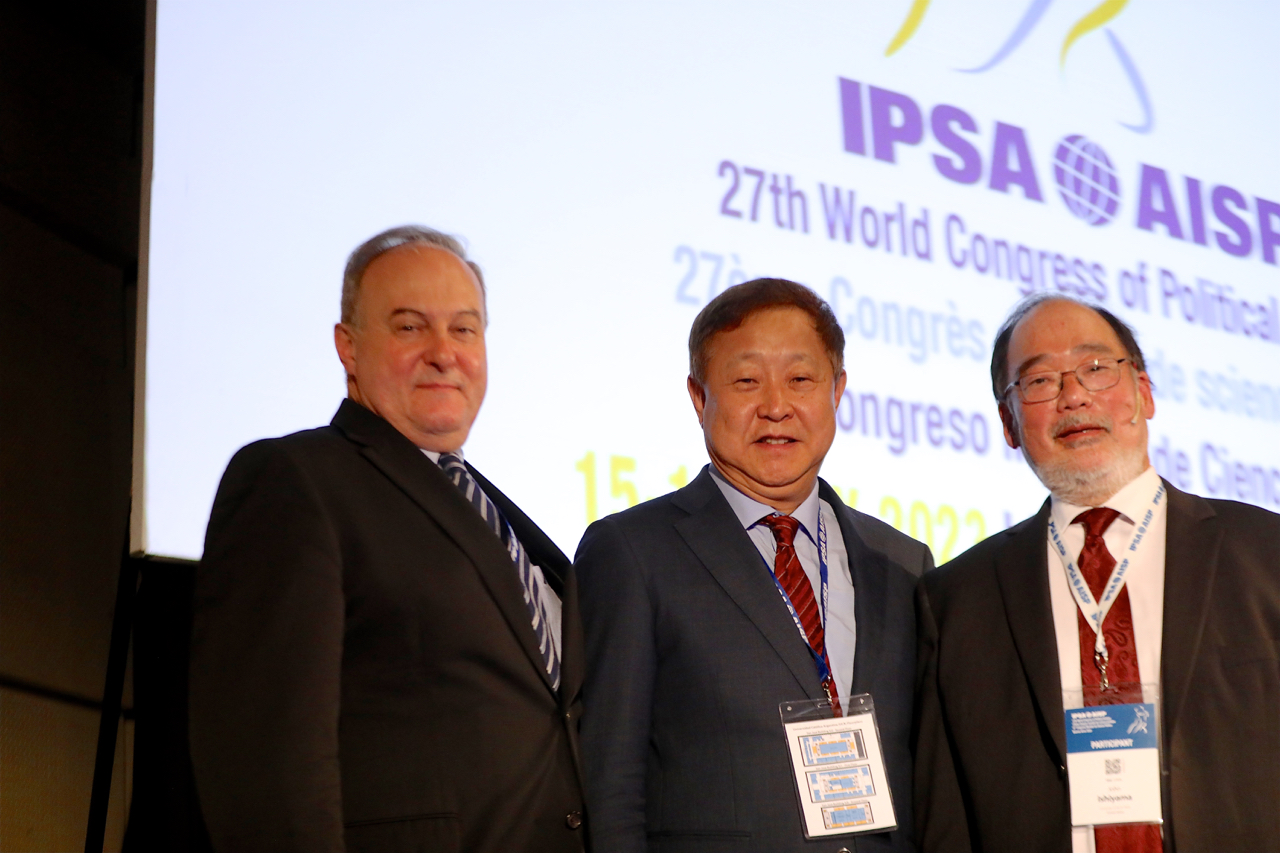 In his plenary, Prof. Ishiyama outlined the key challenges, trends, and opportunities facing the field of political science in the aftermath of the global pandemic. He emphasized the crucial role of political science education in addressing the current global challenges to democracy and stressed the need to rethink and strengthen political science education at all levels, from primary to graduate education.
In his plenary, Prof. Ishiyama outlined the key challenges, trends, and opportunities facing the field of political science in the aftermath of the global pandemic. He emphasized the crucial role of political science education in addressing the current global challenges to democracy and stressed the need to rethink and strengthen political science education at all levels, from primary to graduate education.
Prof. Ishiyama, a pioneer of the APSA Teaching and Learning Conference, shared his insights from years of creating and implementing teaching and learning curriculums. He particularly underscored the importance of promoting engaged citizenship through effective civic education and increased civic engagement among students.
Photo (left to right): IPSA President Pablo Oñate, World Congress Program Co-chair Euiyoung Kim and Keynote Speaker John Ishiyama.
Congress Theme Session: Transboundary Politics as Opportunity Structure: International Orders, Identities and Human Rights
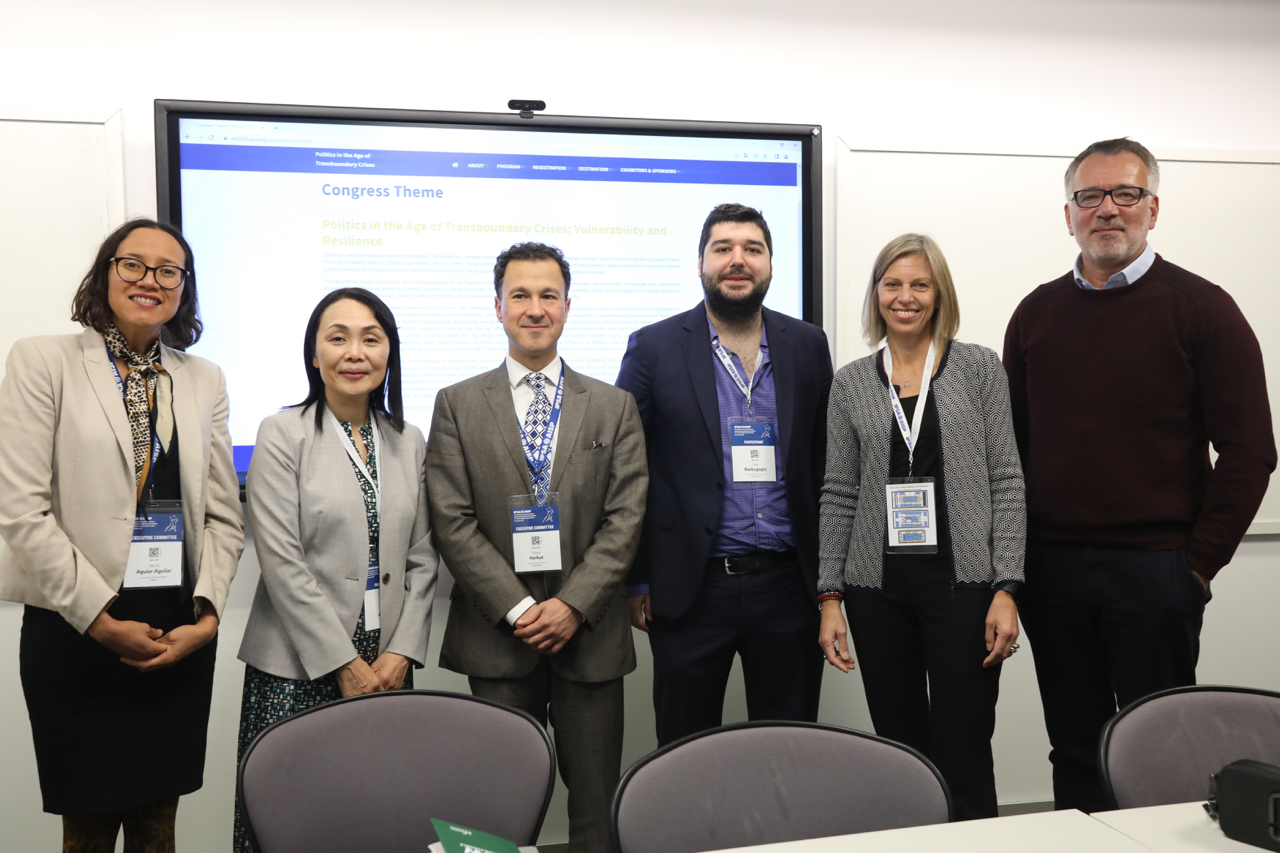
IPSA Vice-President Umut Korkut (Glasgow Caledonian University) chaired the final Congress theme session of the 2023 IPSA World Congress entitled “Transboundary Politics as a Structure of Opportunity: International Orders, Identities, and Human Rights” with the participation of Yuko Kasuya (IPSA President-Elect, Keio University), Azul A. Aguiar-Aguilar (IPSA EC member, Jesuit University of Guadalajara), Tarık Basbuğoğlu (Glasgow Caledonian University) and Anna Triandafyllidou (Toronto Metropolitan University).
The session focused on two main topics: the ontological insecurity of non-Western nations, especially Türkiye, towards the West and the US, and the impact of the Russian-Ukrainian war on the field of political studies. The session explored how non-Western nations struggle to achieve a coherent sense of self that is accepted by the Western community, and how they feel inferior and threatened by the West’s support for their rivals. The session also examined how the Russian-Ukrainian war has challenged the conventional approaches to political studies and called for more attention to cross-border issues and conflicts. Panelists proposed and presented tools and strategies to understand and address these problems more effectively.
Meisel-Laponce Award - Lecture and Roundtable Discussion of International Trends in Political Science Publishing
IPSR Co-editor Daniel Stockemer presented Dr. Niels Spierings, Associate Professor in Sociology at Radboud University, with the 2023 Meisel-Laponce Award for “Best Article in IPSR”. Following Stockemer’s introduction, Dr. Niels Spierings delivered a virtual award lecture and presented the findings of his article Democratic Disillusionment? Desire for Democracy after the Arab Uprisings.
Dr. Niels Spierings’ research examines the impact of the Arab uprisings on the desire for democracy in the Middle East and North Africa region. The award-winning paper uses the relatively new consequence-based theory of democratic attitudes, integrating the notion of deprivation. To test the expectations derived from this framework, the study analyzes data from 45 public opinion surveys conducted in 11 countries in the region between 2001 and 2014. It also conducts a systematic country-level case comparison. The results suggest that the desire for democracy declines mainly in countries where there are significant protests and initial political liberalization, but no substantial democratization (e.g., Egypt, Morocco), and that the absence of significant protests or initial reforms (e.g., Algeria, Yemen) “prevents” disillusionment. The session was followed by a Q&A session.
Memory Activisms: An Opportunity to Re-envision Politics and Political Science
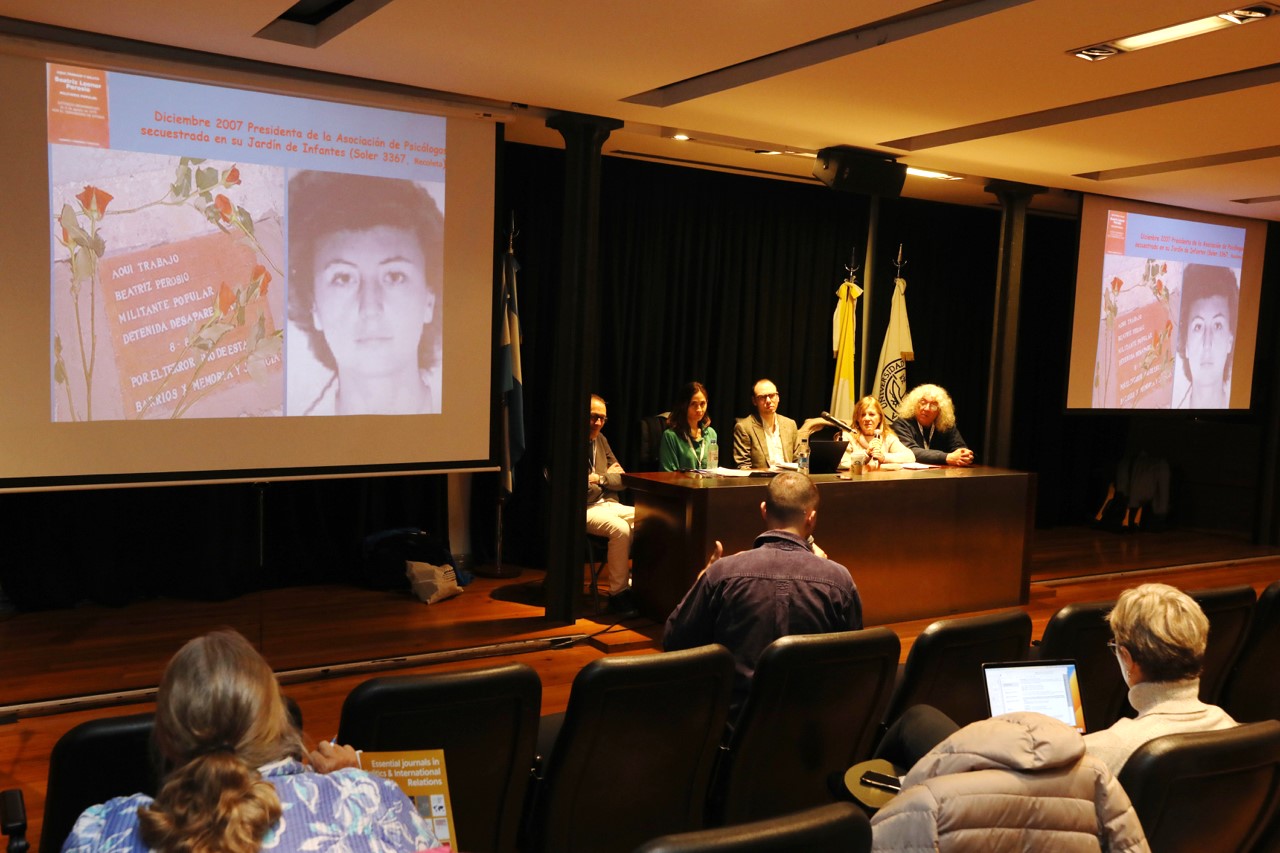 The Special Session “Memory Activisms: An Opportunity to Re-envision Politics and Political Science” focused on Baldosas por la memoria, an initiative developed by the organization Barrios X Memoria y Justicia. Baldosas are memorial paving stones decorated with colors and short descriptions. Produced continuously since 2006 according to an informally established protocol, they memorialize “the disappeared” and others murdered under the state terrorism practiced by the former Argentinian dictatorship (1976-1983). The roundtable began with presentations by political scientists who have studied the baldosas, followed by local activists reflecting on the politics of the baldosas, and additional panelists considering memory and activism.
The Special Session “Memory Activisms: An Opportunity to Re-envision Politics and Political Science” focused on Baldosas por la memoria, an initiative developed by the organization Barrios X Memoria y Justicia. Baldosas are memorial paving stones decorated with colors and short descriptions. Produced continuously since 2006 according to an informally established protocol, they memorialize “the disappeared” and others murdered under the state terrorism practiced by the former Argentinian dictatorship (1976-1983). The roundtable began with presentations by political scientists who have studied the baldosas, followed by local activists reflecting on the politics of the baldosas, and additional panelists considering memory and activism.
You can watch the full video of the session by clicking here.
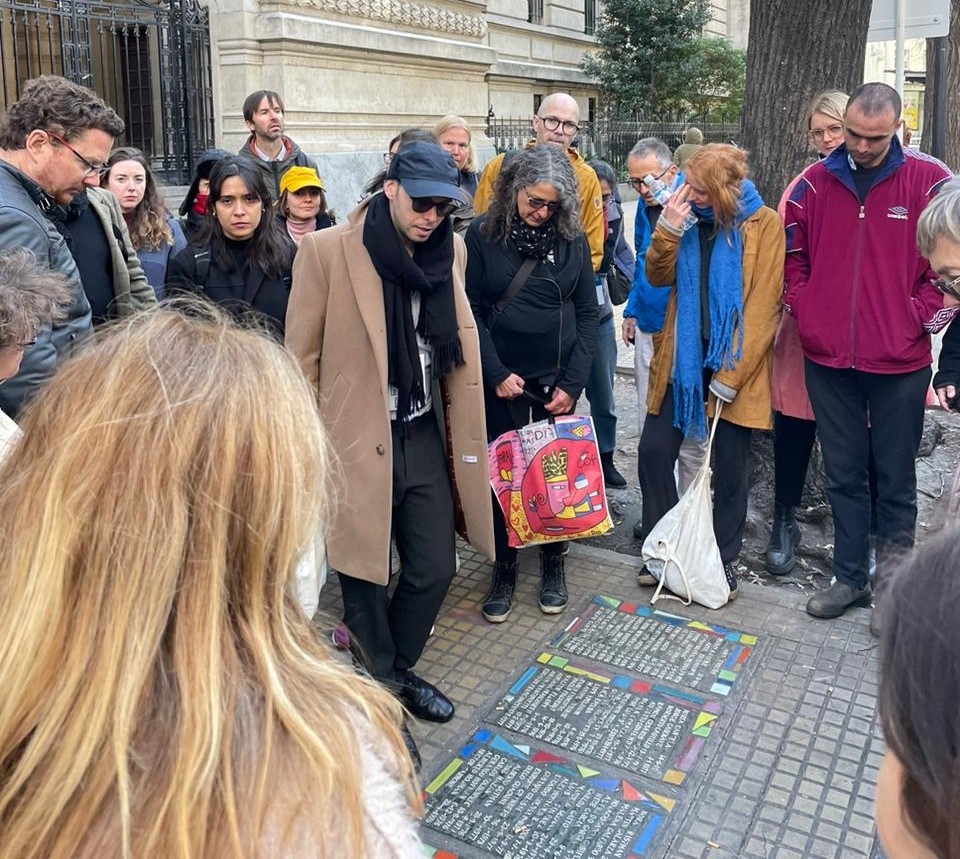
Following the roundtable, participants were invited to join a special guided walking tour with the activists to view the baldosas. Accompanied by local activists Marisa Munczek, Gustavo Esteban Sales and bilingual translators, participants visited baldosas in situ in the nearby area of the Congress site.
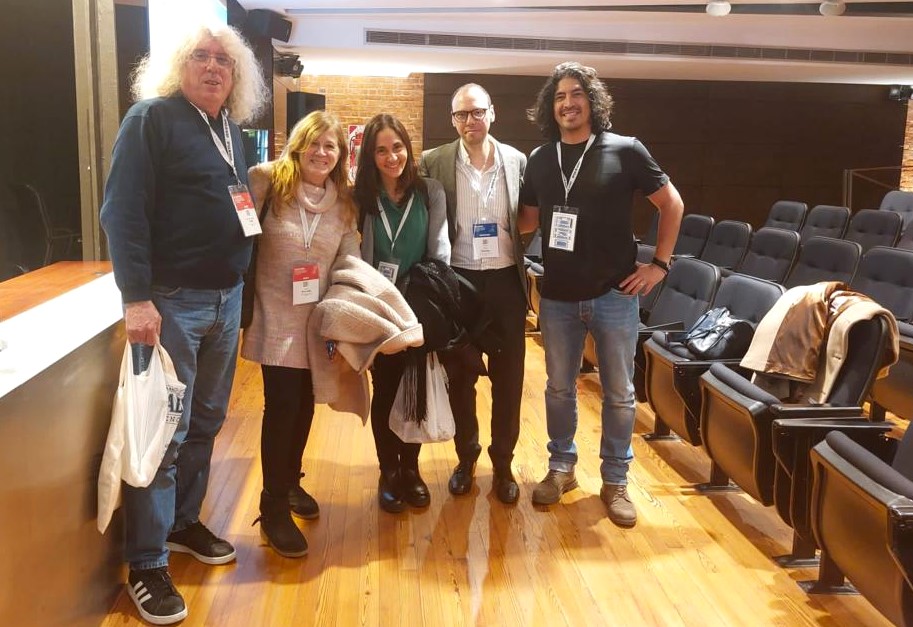 We wish to thank all participants for joining us for the IPSA World Congress Special Session on the baldosas por la memoria organized by the Research Committee 33 - The Study of Political Science as a Discipline and Barrios X Memoria y Justicia. We also would like to thank activists Marisa Munczek and Gustavo Sales for their knowledge, time, and generosity. We are also grateful to organizers and authors of People's Paving Stones: The Material Politics of International Human Rights in the Baldosas por la Memoria of Buenos Aires, International Political Sociology, Oxford Academic Dolores Amat, Terrell Carver and Paulo Ravecca, presenter Luis Escobedo, and Martin Rogard for his terrific job as translator.
We wish to thank all participants for joining us for the IPSA World Congress Special Session on the baldosas por la memoria organized by the Research Committee 33 - The Study of Political Science as a Discipline and Barrios X Memoria y Justicia. We also would like to thank activists Marisa Munczek and Gustavo Sales for their knowledge, time, and generosity. We are also grateful to organizers and authors of People's Paving Stones: The Material Politics of International Human Rights in the Baldosas por la Memoria of Buenos Aires, International Political Sociology, Oxford Academic Dolores Amat, Terrell Carver and Paulo Ravecca, presenter Luis Escobedo, and Martin Rogard for his terrific job as translator.
Photo (left to right): Gustavo Sales, Marisa Munczek, Dolores Amat, Paulo Ravecca and Luis Escobedo
Photos from the special session "Memory Activisms: An Opportunity to Re-envision Politics and Political Science" and the guided walking tour on our Flickr account.
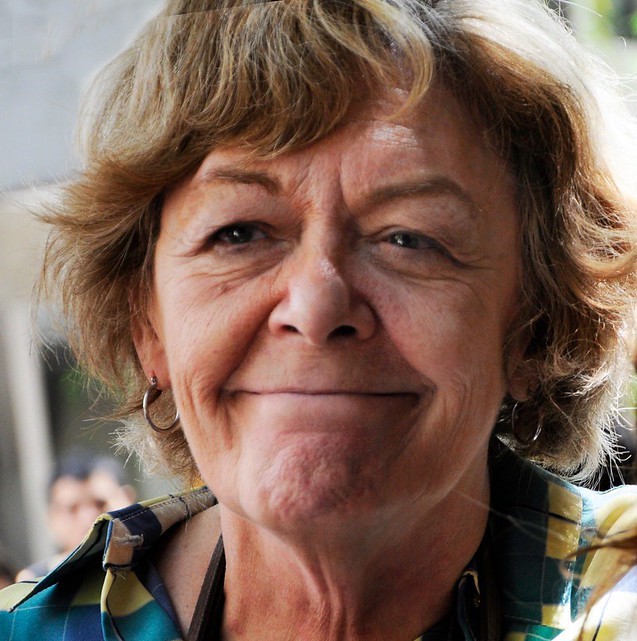
In memory of Alicia Le Fur (06-05-45/20-07-23) a leading activist who cultivated and protected Memory and Justice on the sidewalks of Buenos Aires.
Photo: Mónica Hasenberg
IPSR Editors’ Café
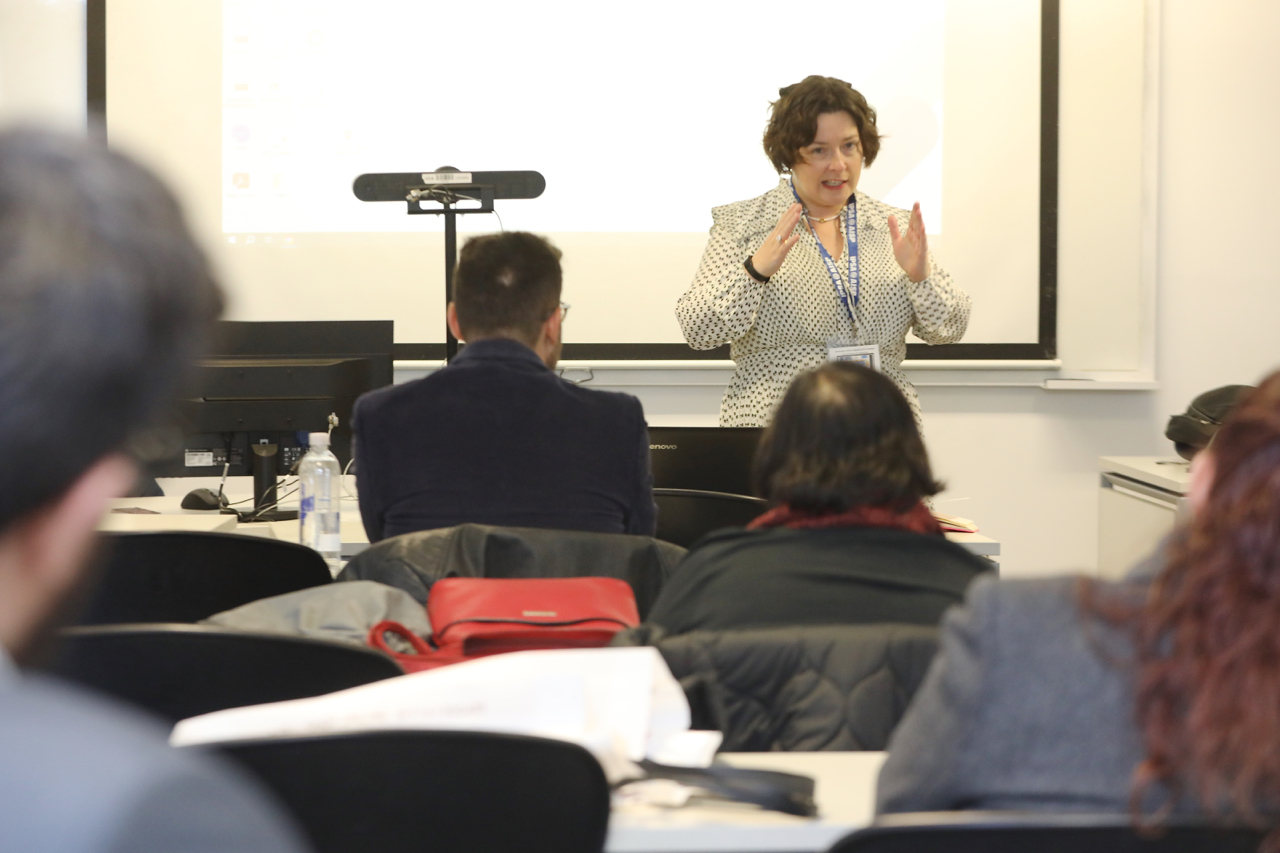 The Editors’ Café session allowed IPSA World Congress participants to meet and talk with the co-editors of IPSA’s flagship journal, the International Political Science Review (IPSR). Co-editors, Theresa Reidy, Annika Hinze and Daniel Stockemer, advised students and early-career scholars alike on a wide range of topics. The session began with a short introduction to IPSR and was followed by a lively Q&A session. Participants asked questions on various topics, including the publication submission review process and timeline. IPSR also hosted a cocktail reception later that evening. The IPSR Co-editors were present to meet participants, publishers and guests.
The Editors’ Café session allowed IPSA World Congress participants to meet and talk with the co-editors of IPSA’s flagship journal, the International Political Science Review (IPSR). Co-editors, Theresa Reidy, Annika Hinze and Daniel Stockemer, advised students and early-career scholars alike on a wide range of topics. The session began with a short introduction to IPSR and was followed by a lively Q&A session. Participants asked questions on various topics, including the publication submission review process and timeline. IPSR also hosted a cocktail reception later that evening. The IPSR Co-editors were present to meet participants, publishers and guests.











